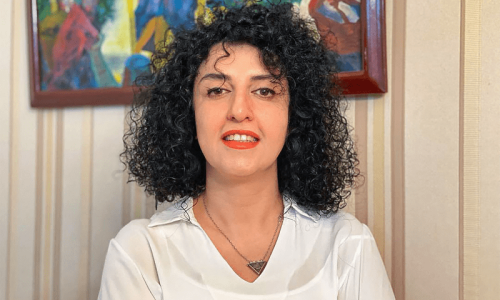 KARACHI, July 12: Large tracts of mangrove forests under the control of multiple agencies – the Port Qasim Authority, Karachi Port Trust and Defence Housing Authority – in the Korangi Creek system have been cut and stand denuded from inside and the process continues at a fast pace in broad daylight, a survey of the affected areas revealed.
KARACHI, July 12: Large tracts of mangrove forests under the control of multiple agencies – the Port Qasim Authority, Karachi Port Trust and Defence Housing Authority – in the Korangi Creek system have been cut and stand denuded from inside and the process continues at a fast pace in broad daylight, a survey of the affected areas revealed.
It has been over a month that the government decided in principle to declare all mangrove forests in the Indus delta protected, though a notification has not been released so far. At present, only those forests under the supervision of the Sindh forest department have the ‘protected’ status, while the rest are under the control of multiple organizations, which have not shown much regard to the valuable marine resource over the decades.
Taking advantage of the situation the timber mafia, allegedly in connivance with government officials, is rapidly stripping the mangrove cover, which acts not only as a natural barrier against tsunamis and cyclones but also as a nursery for fish and shrimps. Karachi, however, is fast losing the natural resource.
Dawn’s team visited the mangroves in the Korangi Creek system, off Rehri Goth and Lat Basti, and the area behind the PAF Korangi base, where it was observed that the forests, which looked dense from a distance, were in fact hollow from the inside where large tracts of trees had been cut.
“Around 10 to 12 donkey carts loaded with logs leave this place daily whereas their number is larger at the other end of the forest,” said a man sitting on his donkey-cart in the area behind the PAF Korangi base.
Each donkey cart, he said, was shared by two to three entrepreneurs who earned Rs700 to Rs800 daily from the business. The logs sold to factories were reportedly used for making different low-cost wooden materials and also as fuel.
“The activity has increased in recent months due to a drastic increase in fuel prices. The logs are sold for Rs120 to Rs130 per maund. The business is being carried out in collusion with government officials,” alleged Abdullah, working with the Pakistan Fisherfolk Forum. The area with mangroves behind the PAF Korangi base is guarded by two private security personnel and reportedly planned to be sold.
About the jurisdiction under which these areas fall, Tahir Qureshi of the IUCN, who has been working on Sindh’s mangroves for 20 years said: “The part of the area behind the PAF Korangi base falls under the administrative control of the DHA, the area behind Baba Bhit Island is under the Karachi Port Trust, while the area in front of Rehri Goth and Lat Basti is under the jurisdiction of the Port Qasim Authority.”
Too many cooks
The same facts have been stated in a report, “The mangroves of Pakistan, status and management,” which Mr Qureshi authored with the support of the Asian Development Bank, the ministry of environment and the Sindh forest department in 2003. “Lack of a single authority and uniform legislation is a major threat to the existence of mangroves. Multiple agencies exercise control over these forests, but nobody is ready to take responsibility. There are also areas which are free-for-all,” he remarked.
The forest department had transferred the area to the Port Qasim Authority for the construction of the port in 1972. However, it didn’t de-notify the status of mangroves and they still enjoy the same protected status.
Upon contact, the DHA’s PRO Colonel Riffat Naqvi denied this statement and said: “No mangroves fall under the jurisdiction of the DHA. We posses only land and have no claims over the Korangi Creek and the plantation therein.”
Shoddy surveillance
Dawn’s team also spotted two forest personnel roaming around to check illegal cutting of mangroves. One of them was a retired employee while the other, Haji Nisar Ahmed, was in his late 60s. He said he was posted there to keep watch in the areas from Ibrahim Hyderi to Shah Bander. Though he had a motorcycle unlike his two subordinates, who were on foot, the forest department had not issued any weapon to him.
When asked why he was not going to the area where mangroves were being illegally chopped off, he said: “We are ordered to fine those who bring logs and transport them. How can we go inside without any weapon? These men have axes and can attack us. I also bear petrol expenses myself.”
Coastal Divisional Forest Officer Tahir Durrani admitted that the department faced a lack of manpower and resources, but contended that the best was being done and a lot of efforts were being made to improve mangrove plantation.
“The forests under the control of the forest department are protected under the 1958 notification that entitled them to a certain status and as such, their commercial harvesting is banned. However, these laws are not applied to areas which don’t come under our jurisdiction,” he said, adding that a formal notification to declare all mangrove forests ‘protected’ without challenging land ownership is awaited, after which the forest department would provide technical expertise for conservation to the organizations concerned.
Large-scale destruction of mangrove forests is also being carried out in the area behind Baba Bhit Island, according to area residents who have lodged many complaints with the forest department and other officials concerned.
About the destruction of mangrove forests in the Baba Bhit Island area, Mohammad Hussain, a social activist, said big wood godowns had been set up in Machchar Colony from where people came in boats daily to cut trees. “Tons of logs are being taken away. Though the business has been going on for ages, it has developed on a mass scale during the last year-and-a-half. All this is happening despite the fact that the KPT’s pollution control offices are located nearby. With the help of some colleagues, I caught some thieves, but they were later released by the police on the pretext that no law exists to punish such offenders,” he added.














































Dear visitor, the comments section is undergoing an overhaul and will return soon.